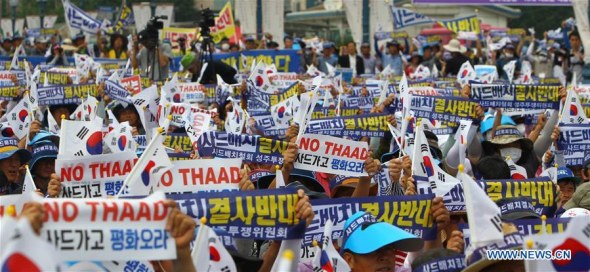
People from Seongju county hold the national flags of South Korea and banners to protest against the deployment of the Terminal High Altitude Area Defense (THAAD), during a rally in Seoul, capital of South Korea, on July 21, 2016. (Xinhua/Yao Qilin)
The controversial deployment of the Terminal High Altitude Area Defense (THAAD) system on the Korean Peninsula is increasing concerns in neighboring China where some worry that a new Cold War is looming.
But make no mistake. It is not fear of the U.S. anti-missile shield that drives such concerns, for China has never, and will never, accepted threats that encroach on its national security.
The Republic of Korea (ROK) last month announced plans for a THAAD battery to be deployed in Seongju county, 300 km southeast of Seoul, by the end of next year.
Washington claims that THAAD can help defend the ROK against potential security threats from its neighbor, the Democratic People's Republic of Korea (DPRK).
But the missile shield is designed to intercept incoming inter-continental ballistic missiles at relatively high altitudes, whereas the DPRK needs only short-range rockets and conventional arms to launch attacks on its southern neighbor. This alone renders THAAD a completely ineffective deterrent.
Furthermore, THAAD has a 200 km-range for intercepting missiles, yet it is to be set up 300 km southeast of Seoul, far from the DPRK border. This means the capital and its surrounding areas, the country's most populous region, will not be protected.
Again, this clearly shows that there is a hidden agenda behind THAAD, an installation that barely covers Seoul, but extends its reach to China and Russia's Far East.
With its X band radar, commanding surveillance of an area that extends over 1,200 miles from the peninsula, THAAD can be used to collect the radar data of warheads and decoys of China and Russia's strategic missiles by monitoring their experiments, thus enabling the United States to neutralize China and Russia's nuclear deterrents and put their national security at risk.
This muscle flexing, marked by strings being pulled from Washington where the fallacy of a fictional China threat has been trumpeted for years, is now bringing real, strategic threats to China's doorstep.
However, those who wish to scare China will be deeply disappointed, for China has never, nor will ever, bowed down in the face of external security threats.
By deploying this weapons system, which far exceeds the Korean Peninsula's defense needs, the ROK is skating on very thin ice by aiding the United States in compromising China's legitimate security interests. It is also destabilizing the strategic balance as well the stability of the region, which it claims that it set out to maintain in the first place.
Seoul should wake up and realize that China has never been a source of regional tension and instability, and its neighborly diplomatic philosophy of amity, sincerity, mutual benefit and inclusiveness, should not warrant schemes that undermine the country's national security.
Seoul should also realize that it is amity and goodwill between neighbors, rather than a handful of high-tech weapons, that constitutes the true shield of regional peace and stability.


















































